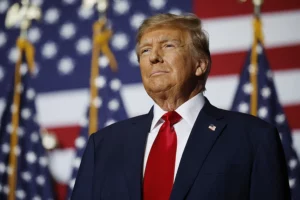The Trump administration has introduced two new memorandums focusing on shielding U.S. tech companies from unfair international taxes and restricting foreign investments in crucial sectors, emphasizing a strong stance on economic independence.
Striking Back: New U.S. Directives to Combat Digital Taxation and Foreign Investment Risks

Striking Back: New U.S. Directives to Combat Digital Taxation and Foreign Investment Risks
President Trump's latest memorandums aim to protect American technology firms from foreign digital service taxes and safeguard key industries from Chinese investments.
---
On Friday evening, President Donald Trump reaffirmed his administration's commitment to American economic interests by signing two significant memorandums aimed at countering unfair foreign taxation on U.S. technology companies and curbing Chinese investment in critical industries vital to national security.
The first memorandum addresses the issue of digital service taxes that several countries, notably France, Canada, and the United Kingdom, have placed on major American tech firms like Apple, Google, Meta, and Amazon. These taxes have sparked controversy and accusations of unfairness, prompting Trump to take direct action that includes imposing tariffs on these nations. Moreover, the U.S. Trade Representative has been directed to reevaluate similar tax practices globally, reaffirming the stance that only American entities should be subject to taxation by other countries.
The second memorandum is strategically designed to protect core U.S. industries—including technology, agriculture, shipping, minerals, and food production—from foreign exploitation, particularly from China. Although China is not explicitly named, the policy reflects a strong sentiment to safeguard national interests. The Committee on Foreign Investment in the United States (CFIUS) will enforce new regulations to limit Chinese investments in sectors essential to the country's security. Additionally, there are discussions around restricting outbound U.S. investments to China, highlighting a comprehensive strategy to reduce economic reliance on Beijing.
These initiatives are a continuation of Trump's long-held belief in prioritizing American interests, a view taking center stage in ongoing discussions about digital service taxes and national security. By instituting tariffs and investment limitations, the current administration underscores its intention to protect U.S. workers and maintain a strong domestic economy free from foreign manipulation.
As tensions over digital taxes escalate, U.S. officials are increasingly concerned that nations such as France and Canada are generating substantial revenue by taxing American-made digital goods, including software, music, and entertainment. Trump's tariffs aim to level the playing field for U.S. businesses in the global market.
Simultaneously, the growing presence of Chinese investments in critical U.S. industries has raised concerns across the political spectrum. The latest policy initiatives reflect the belief that the security of the economy is inextricably tied to national security, reinforcing efforts to guard American innovation from any foreign threats.
With these impactful measures, President Trump is taking a decisive stand to ensure the continued growth and strength of the American economy, making it clear that the U.S. will not acquiesce to policies that jeopardize its businesses and labor force. These memorandums convey a strong message: the American economic landscape must remain protected and resilient against foreign encroachment.
On Friday evening, President Donald Trump reaffirmed his administration's commitment to American economic interests by signing two significant memorandums aimed at countering unfair foreign taxation on U.S. technology companies and curbing Chinese investment in critical industries vital to national security.
The first memorandum addresses the issue of digital service taxes that several countries, notably France, Canada, and the United Kingdom, have placed on major American tech firms like Apple, Google, Meta, and Amazon. These taxes have sparked controversy and accusations of unfairness, prompting Trump to take direct action that includes imposing tariffs on these nations. Moreover, the U.S. Trade Representative has been directed to reevaluate similar tax practices globally, reaffirming the stance that only American entities should be subject to taxation by other countries.
The second memorandum is strategically designed to protect core U.S. industries—including technology, agriculture, shipping, minerals, and food production—from foreign exploitation, particularly from China. Although China is not explicitly named, the policy reflects a strong sentiment to safeguard national interests. The Committee on Foreign Investment in the United States (CFIUS) will enforce new regulations to limit Chinese investments in sectors essential to the country's security. Additionally, there are discussions around restricting outbound U.S. investments to China, highlighting a comprehensive strategy to reduce economic reliance on Beijing.
These initiatives are a continuation of Trump's long-held belief in prioritizing American interests, a view taking center stage in ongoing discussions about digital service taxes and national security. By instituting tariffs and investment limitations, the current administration underscores its intention to protect U.S. workers and maintain a strong domestic economy free from foreign manipulation.
As tensions over digital taxes escalate, U.S. officials are increasingly concerned that nations such as France and Canada are generating substantial revenue by taxing American-made digital goods, including software, music, and entertainment. Trump's tariffs aim to level the playing field for U.S. businesses in the global market.
Simultaneously, the growing presence of Chinese investments in critical U.S. industries has raised concerns across the political spectrum. The latest policy initiatives reflect the belief that the security of the economy is inextricably tied to national security, reinforcing efforts to guard American innovation from any foreign threats.
With these impactful measures, President Trump is taking a decisive stand to ensure the continued growth and strength of the American economy, making it clear that the U.S. will not acquiesce to policies that jeopardize its businesses and labor force. These memorandums convey a strong message: the American economic landscape must remain protected and resilient against foreign encroachment.






















